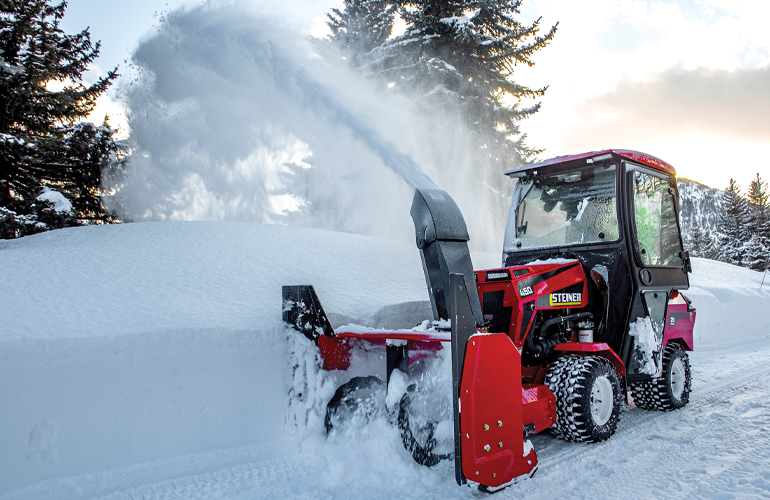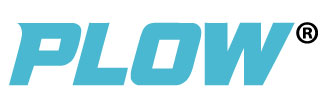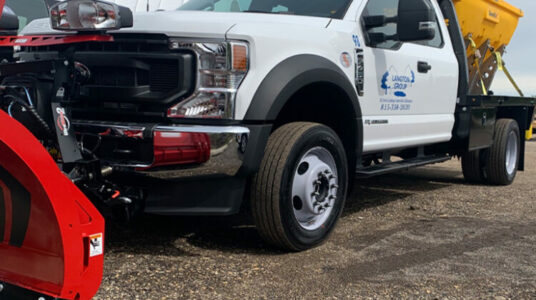5 tips on purchasing—from pusher plows to UTVs.
While the beauty of lawn care can be its scheduling consistency, snow removal’s inherent unpredictability requires a different approach. Professional snow removal operations can be extremely profitable, but they require versatility and the ability to take on a big project on short notice.
The unpredictability of snow events can also affect purchasing decisions. If you’re investing in snow removal equipment, how do you ensure you’re going to get a good return on investment? After all, depending on location, some winters it may snow a lot, while others it may snow very little.

Contrary to what you might think, there are a lot of options beyond just hitching a straight blade plow to the front of your pickup truck—although that’s a perfectly viable solution. Industry experts from Douglas Dynamics (manufacturer of WESTERN, FISHER, and SnowEx brands) and Steiner tractors offer their perspective on ways you can invest in snow removal while keeping the spirit of year-round versatility.
1. Know The Task.
Snow industry insiders recommend you know exactly what you’re planning to do with your equipment before you purchase. Remember that there are all kinds of snow removal applications, not just streets and parking lots. Ron Scheffler, senior product manager for Steiner, says to ask yourself the following questions: What kind of areas will I need to take care of– sidewalks, driveways, etc.? Will I need compact equipment, and if so, how nimble will it need to be? What kinds of snow attachments will be required? Will I need to push or throw snow out of the way? Will I need additional attachments to spread salt or sand?
There are sidewalks and pathways that are perfect fits for UTV’s, and some tight fits might be better suited for a snow thrower. It’s all in finding what works best for your specific applications. Doug Clark, Snow Control product manager at Douglas Dynamics, points out that “one person, on a small piece of equipment can do the job of three or four shovelers, and in a fraction of the time.”
Clark recommends keeping your focus on the primary use of the equipment. He comments, “Buy your equipment for its primary purpose. Dump trucks transport stuff, wheel loaders load stuff, UTVs move around job sites off-road, and so forth. There’s a primary purpose for purchasing everything, and you should never compromise about that.”
Scheffler’s recommendation is a two-prong approach: “Minimally for first purchasing, I recommend something to push snow and something to throw it, as this will allow you to get various clients.”
As for Clark, he suggests three options to get your bases covered: “You’ll need a snow mover such as a plow that can get into smaller areas, probably a large plow or pusher for wide open lots, and some kind of sidewalk clearing mechanism. Respectively that means a one-ton to Class 4 or 5 truck; a skid steer, compact or regular wheel loader; and possibly a UTV.“
Before looking to purchase, however, you’ll want to assess what’s already at your disposal, according to Erin Hunt, Non-Truck product manager at Douglas Dynamics. “If you are considering adding snow removal services to your lawn business, you will want to start by leveraging the equipment you already have,” she says. “A pusher plow is a terrific place to start because it is easy to use and can fit on various loaders, skid steers, and tractors.”
2. Think Year-Round ROI.
Since you can never truly depend on snow and ice jobs as you can with turf maintenance, you need to ensure your equipment isn’t going to waste. “If you have equipment sitting around in storage over the winter months, then it’s not making you money,” Hunt notes. “However, adding winter services to your business can help spread your expenditures over 12 months.”
Ultimately, the goal of adding snow services (or purchasing snow equipment) is to expand your business, make it more profitable, and provide work in the “off-season.” Clark recommends assessing how your equipment can be used year-round. For instance, he says, “A wheel loader and dump truck that moves dirt seven months out of the year can move piled snow away the other five. If you own a piece of heavy equipment, you can use it to move snow in one way or another, turning each piece of equipment into a profit center 365 days a year.”
3. Look For Versatility.
As Clark notes, ensuring that vehicles and equipment excel at a primary task is key, but it’s also important to find equipment that can adapt to your needs. For example, skid steers are becoming more and more popular for 365-day versatility. They can do heavy construction work, as well as move large piles of snow with a pusher plow attachment.
Articulating tractors are another option for year-round use since they have many attachments for all seasons. “Steiner offers snow thrower, plow blade, v-blade, front broom, and bucket attachments with a quick attachment design to help make fast changes as necessary between clients,” says Scheffler. “It is compact and articulates to get in and out of tight spots when moving snow.”
Hunt points out the value of purpose-built products for specific machines— from UTVs to skid steers to half-ton trucks. “For example, our UTV V-plow quickly configures from straight to scoop angling to 5’ wide to efficiently plow sidewalks.” Products with multiple features ensure the maximum benefits to the user for their money.
4. Mind, Manpower & Maintenance.
Beyond the versatility of the equipment, there are other considerations for year-round ROI on snow equipment purchases—like keeping employees working. Clark notes that if you can keep employees earning a living throughout the year, you’ll have much better retention—no small benefit in today’s labor market. “By adding counter seasonal activities, in this case snow and ice operations, you greatly reduce the chance that come next season your best folks have moved on to something or someone else,” says Clark. “They too have a real incentive to smooth out their cash flows. There’s nothing like a year-round paycheck to reduce employee turnover in an otherwise seasonal business.”
Keep in mind that winter labor hours aren’t just about the snow event. Scheffler urges snow removal operators to pay special attention to equipment they’re using year-round as it will require a disciplined maintenance schedule to stay in good condition: “Maintenance is always important no matter the season, but the winter is especially tough on equipment,” he comments. “Ensure the proper fluids are topped off in your equipment, and that all moving and rotating parts are lubricated and greased as required to help fend off rusting and wear. Always keep your equipment clean and ready to go for the next job and to help keep snow and ice from building up.”
Achieving Liquidity In Snow Services
Liquids can help with achieving lower application rates on both pre- and post-event treatments when it comes to snow services.
5. Consider Your Customer.
In a service-based business, all decisions should come back to how you can do the best job possible for your customers. If you’re meeting their needs and delivering great results, you’re on the right track. Clark advises, “Look at the issue from your customer’s perspective. They’re open for business year-round, and they need ser- vices year-round. If you aren’t servicing them well, in what is normally the off-sea- son, they will find someone who does. Then your primary business is at risk too.”
Customers are looking for solutions, and adding versatile snow removal equipment to your business can help fill in the gaps and make you a one-stop shop for all their needs.
While experts have recommendations or what snow removal equipment purchases make the most sense, you know your business best. As Hunt states previously, if you’ve already got some of the equipment mentioned for your lawn care work, you’re already ahead of the game, and can purchase equipment that fits the vehicles you have. Functionality and versatility are the key fac- tors to consider, and with a couple of strategic purposes, you can unlock the full potential of your business for an entirely new season.

Covelli is the content director at West Bend, WI-based EPIC Creative, a full-service marketing and advertising agency serving the Green Industry for 30 years.
Do you have a comment? Share your thoughts in the Comments section below, or send an e-mail to the Editor at cmenapace@groupc.com.











![[VIDEO] Dickies®: Discover Workwear That’s Anything But Uniform](https://turfmagazine.com/wp-content/uploads/2023/06/1647663814-4b1a2a7742790a9b1e97a3b963477850192e1d6a9dfba9b07214a77bae25d6e3-d-218x150.jpg)





























![[VIDEO] Dickies®: Discover Workwear That’s Anything But Uniform](https://turfmagazine.com/wp-content/uploads/2023/06/1647663814-4b1a2a7742790a9b1e97a3b963477850192e1d6a9dfba9b07214a77bae25d6e3-d-324x160.jpg)